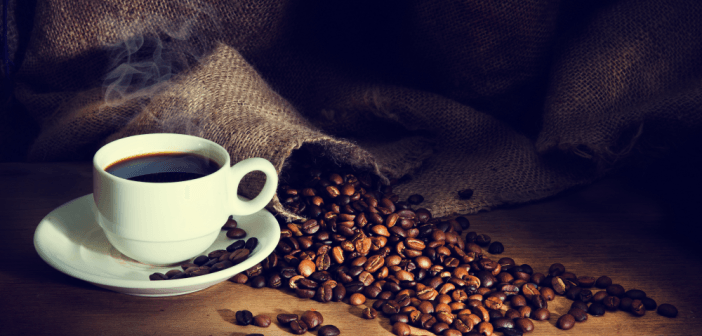Is it nature to love coffee? Love and hatred between Coffee and genes

For professional baristas, please follow the coffee workshop (Wechat official account cafe_style)
Many people wake up in the morning and find it difficult to wake up and start the day without a cup or two of coffee. Cafes in Europe and the United States are also popular places for writers and artists to seek inspiration or socialize.
Coffee, why can it keep people awake? It turns out that caffeine is similar in molecular shape to Adenosine. On the other hand, adenosine can inhibit the central nervous system and inhibit the release of some neurotransmitters when it binds to the receptor, which has a sleeping and sedative effect. On the other hand, caffeine antagonizes adenosine, and caffeine binds to adenosine receptors, which makes adenosine stare as a result of the competition, so it does not have a sleeping and calming effect. Caffeine, strictly speaking, doesn't make people clearer, it just keeps people awake.

Coffee gene sequencing
So why does coffee make caffeine? The most popular coffee is Arabica coffee (Coffea arabica, also known as small fruit coffee), which has 44 pairs of chromosomes. But the coffee Coffea canephora (also known as C. robusta, which accounts for about 30% of the world's total coffee production, mainly used as instant coffee), which has 22 pairs of chromosomes, is used for genome sequencing. Its whole genome sequencing was completed in 2014 and published in Science [1].
From the genomic analysis of coffee, it is found that coffee not only produces caffeine, but also has more genes to synthesize phenolic secondary compounds (phenylpropanoids). These genes include enzymes for the synthesis of flavonoids (isoflavone and flavnoids), alkaloids (alkaloids), monoterpenes (monoterpene), and caffeine (caffeine).
So does coffee synthesize caffeine to excite or refresh animals? According to legend, people living in Ethiopia inadvertently find that sheep eat coffee berries, will be particularly excited, their own taste also has a refreshing effect, they began to pick to eat. Caffeine is generally thought to have insect-resistant effects, and some organic farmers use coffee grounds as a natural insect repellent. Coffee leaves also contain caffeine, which should be anti-insect, but coffee beans are seeds, generally compared to leaves, insects can not eat, so why also contain caffeine?
In fact, caffeine can also inhibit seed germination, because caffeine can inhibit cell division, so it can compete with other seeds. Then why doesn't caffeine inhibit the sprouting of coffee beans? The reason is that as soon as coffee beans absorb water, they send water to the roots and buds, causing them to expand rapidly and keep the growth point away from caffeine, so meristem can divide and grow [2].

Is coffee good or bad for health?
We humans drink caffeine, of course, not for deworming or dormancy, but for refreshing. For people who don't like coffee, whether coffee can affect their health is important. The key is how much you need it, right?
The American Heart Association says studies on heart disease caused by coffee are contradictory. The World Health Organization, which has classified coffee as "possible" for years, recently reversed that claim, alleging that the evidence for cancer caused by coffee drinking is "insufficient". Why is there so much contradictory evidence about coffee? In recent years, scientists have found that the answer may lie in our genes.
Why are some people so excited or even anxious as long as they drink a cup of coffee? some people are still drowsy after drinking several cups. Ahmed El-Sohemy, a nutrition scientist at the University of Toronto in Canada, and others found that the gene CYP1A2 of an enzyme determines the rate at which our bodies break down caffeine.
A mutation in the CYP1A2 gene causes the liver to metabolize caffeine quickly. If you have two "fast" mutations, the body metabolizes caffeine about four times as fast as people with two "slow" mutations. 40% of people have two copies of the "fast" genetic mutation, so they are fast metabolites. About 45% of people have both slow and fast mutations, while 15% carry two slow versions.
They studied 4000 adults, 2000 of whom had had a heart attack. He found that drinking more than four cups of coffee a day increased the risk of heart attack by 36% [4]. However, when they were grouped according to their CYP1A2 genotypes, the increased risk of heart attack occurred only in those with slow metabolism; for those with fast metabolism, drinking coffee had a protective effect on the heart. Another group of scientists saw a similar phenomenon in high blood pressure. Coffee addiction in people with slow metabolism increased their chances of developing high blood pressure, while those with fast metabolism were on the contrary.
In addition to being associated with heart disease, coffee is also said to improve exercise performance. Christopher J. Womack, a kinesiologist at James Madison University in the United States, found that fast metabolites also benefit more from caffeine. In a 2012 study, Womack et al. studied the effects of caffeine pills and placebos on the performance of male cyclists. They found that people with slow metabolism gained only a minute faster in the 40-kilometer race. However, people with fast metabolism are four minutes faster.
In this way, people with slow metabolism should not drink more coffee unless they are addicted to it. So does the love of coffee have anything to do with genes? A large multinational research team has found that there are about eight genes related to people's preference for coffee [7]. Whether coffee loves you and whether you love coffee, it seems that gene is the big brother behind it!
Reference:
1. Denoeud F, et al. The coffee genome provides insight into the convergent evolution of caffeine biosynthesis. Science. 2014 Sep 5: 2014 (6201): 1181-4. Doi: 10.1126/science.1255274. Epub 2014 Sep 4.
two。 By Saul Hansen (Thor Hanson), translated by Xiao Baosen, the Victory of Seeds: how cereals, nuts, nuts, legumes, and nuclear seeds conquer plant kingdoms and shape human history (The Triumph of Seeds: How Grains, Nuts, Kernels, Pulses, and Pips Conquered the Plant Kingdom and Shaped Human History), published in Shang Zhou, 2015.
3. Anahad O'connor. For Coffee Drinkers, the Buzz May Be in Your Genes. The New York Times. July 12, 2016. Http://well.blogs.nytimes.com/2016/07/12/for-coffee-drinkers-the-buzz-may-be-in-your-genes/?smid=fb-nytscience&smtyp=cur&_r=0
4. Cornelis MC, et al. Coffee, CYP1A2 genotype, and risk of myocardial infarction. JAMA. 2006 Mar 8x 295 (10): 1135-41.
5. Palatini P, et al. CYP1A2 genotype modifies the association between coffee intake and the risk of hypertension. J Hypertens. 2009 Aug;27 (8): 1594-601. Doi: 10.1097/HJH.0b013e32832ba850.
6. Womack CJ, et al. The influence of a CYP1A2 polymorphism on the ergogenic effects of caffeine. J Int Soc Sports Nutr. 2012 Mar 1510 9 (1): 7. Doi: 10.1186 doi 1550-2783-9-7.
7. Coffee and Caffeine Genetics Consortium, et al. Genome-wide meta-analysis identifies six novel loci associated with habitual coffee consumption. Mol Psychiatry. 2015 May;20 (5): 647,56. Doi: 10.1038/mp.2014.107. Epub 2014 Oct 7.
Important Notice :
前街咖啡 FrontStreet Coffee has moved to new addredd:
FrontStreet Coffee Address: 315,Donghua East Road,GuangZhou
Tel:020 38364473
- Prev

Japanese Coffee Shop Rejects Children Accidentally Leads to Child Discipline Discussion
Professional barista communication, please pay attention to coffee workshop (Weixin Official Accounts cafe_style) A Japanese-style coffee shop in Japan, a few days ago, the Japanese-style sliding door in the store was destroyed by children, so that the shopkeeper refused to bring children to the door, accidentally triggered netizens to discuss child discipline issues. Finally, after parents call to apologize, comedy closes
- Next

Coffee workers living in Japan are hidden as mothers in the six tortoise mountains to promote coffee culture.
Coffee worker Sui Yuanjian (1 from left) has a coffee roasting license certified by GRN in Japan. two years ago, because his mother was old and needed to be taken care of, he returned to settle down in Kaohsiung. After serving his mother, Sui Yuanjian devoted himself to community activities and founded Shancheng Black Coffee combined with rural experience. For professional baristas, please follow Sui Yuanjian, coffee clerk in coffee workshop (official Wechat account cafe_style).
Related
- Unexpected! Ruixing Telunsu lattes use a smoothie machine to foam milk?!
- % Arabia's first store in Henan opens into the village?! Netizen: Thought it was P's
- Does an authentic standard mocha coffee recipe use chocolate sauce or powder? Mocha Latte/Dirty Coffee/Salty Mocha Coffee Recipe Share!
- What is the difference between Vietnam egg coffee and Norway egg coffee? Hand-brewed single product coffee filter paper filter cloth filter flat solution!
- What is the difference between sun-cured and honey-treated coffee? What are the differences in the flavor characteristics of sun-honey coffee?
- How to make Italian latte! How much milk does a standard latte use/what should the ratio of coffee to milk be?
- How to make butter American/butter latte/butter Dirty coffee? Is hand-brewed coffee good with butter?
- Is Dirty the cold version of Australian White? What is the difference between dirty coffee/decent coffee and Australian white espresso?
- Relationship between brewing time and coffee extraction parameters How to make the brewing time fall to 2 minutes?
- Got entangled?! Lucky opens a new store, Mixue Ice City, and pursues it as a neighbor!

